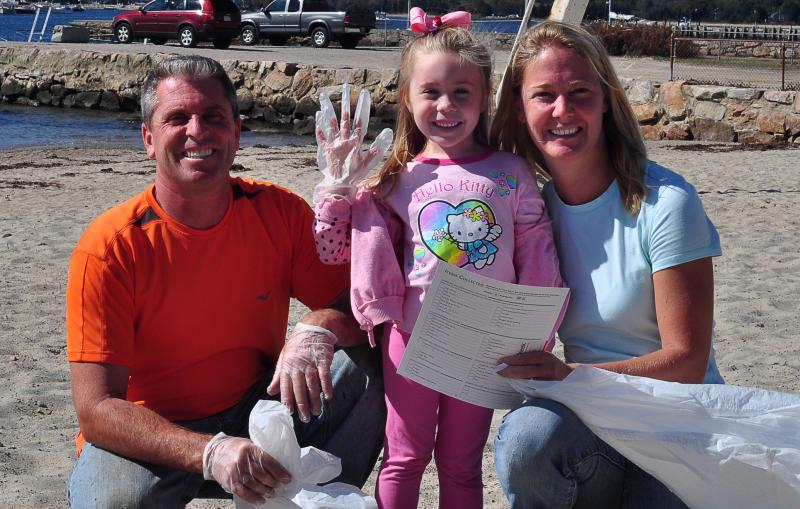Mattapoisett, Marion join in international clean-up
Pam Souza didn't know until Friday night that they were holding a beach clean-up on Saturday.
"I felt bad, I was calling my friends last minute," she said about her late-night efforts to pull together a volunteer effort to clean up the Mattapoisett Town Beach as part of the Ocean Conservancy’s Annual International Coastal Cleanup.
"My friend Sara Collier, her husband Jeremy Collier and son and daughter helped clean up another Mattapoisett beach," said Souza. Altogether, despite things being last-minute, Souza was able to rally a team of seven Mattapoisett volunteers, last year there were only six.
In Marion, Mattapoisett, and Wareham, volunteers picked up litter and trash along the shoreline, making sure their beaches stayed in pristine shape.
Participants were part of a world-wide effort of over 350,000 people in 70 countries -- all doing the same thing on the same day in their home towns.
Souza, the Volunteer Coordinator for Mattapoisett, made contact with Peter Converse McDonald, Coordinator of the Massachusetts CoastSweep effort along the northern shores of Buzzards Bay, at the last minute and made quick work of preparing for the next day's sweep.
"I think the cleanup went well," said McDonald. "Though turnout was lower than in the past, we still managed to pick up Silvershell Beach and the Piney Point beach in Marion, and Pam Souza did a great job with the volunteers she was able to find at the last moment over in Mattapoisett."
Picking up trash and cigarette butts on Town Beach, Souza said that last year's turn out was higher with six people showing up as opposed to this year's two. She added, however, that the preparations were last minute and that she was still going to give it her all to make sure the beaches stayed clean.
Over in Marion, Hollie Danhauser and a few other volunteers took responsibility for sweeping Silvershell Beach of any trash.
"Luckily there wasn't too much to cleanup," said Danhauser. "I found lots of fishing wire and some hooks and weights and scraps of rope."
Danhauser added that other people found bottles, toys and paper and plastic garbage.
"Peter MacDonald was on hand to help get us started and collect what we found," she said.
"Mostly, it's cigarette butts," said Souza. "I can't believe people still smoke."
Souza was also given a tracking sheet by McDonald to provide collection data so that the Urban Harbors Institute and the Ocean Conservancy can determine what the largest contributors to beach and harbor pollution are.
Although Souza made quick work of Town Beach, there's still plenty of work to be done.
"Next Sunday at 2 p.m. a team of students and faculty from Tabor Academy in Marion will sweep over Planting Island and its causeway to the mainland," said McDonald. "They've been helping us for three years now and always come up with the most trash, again because of the southwest pushing stuff ashore all summer long."
McDonald expects that all of the data collected from this year's Coastal Sweep will be ready by mid-October.
According to the Ocean Conservancy, “During the 25th anniversary cleanup in 2010, 615,407 volunteers in 114 countries picked up more than 8 million pounds of trash and other debris —- enough to cover about 200 football fields -- trash that has a major impact on ocean health. Toxic materials enter the food chain, sharp items injure beachgoers, and accident-causing debris snarls boat propellers. Trash weakens economies, sapping precious dollars from tourism and our seafood industries. And it harms individual species as well as entire ecosystems, like coral reefs, that are essential for the survival of marine life.”
Here in Massachusetts last year 48% of the debris originated from land-based activities such as picnics, festivals, sports, and beach activities. Litter washed from streets, parking lots, and storm drains also contributed to this category of debris. Worldwide, these activities accounted for 58% of the debris collected.
Smoking-related activities, in the form of cigarette filters, cigar tips, and tobacco packaging, accounted for 63% of the debris found in Massachusetts.
Globally, debris from smoking-related activities made up 38% of the debris collected. Debris items from ocean and waterway activities - activities that originate offshore - accounted for 9% of the debris found in Massachusetts.














